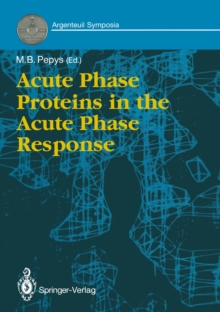
Acute Phase Proteins in the Acute Phase Response Paperback / softback
Edited by Mark B. Pepys
Part of the Argenteuil Symposia series
Paperback / softback
Description
The discovery of C-reactive protein in the laboratory of O.
T. Avery at Rockefeller University in 1929-30 was the first specific obser- vation of the acute phase plasma protein response (Tillett and Francis 1930).
This was one of three contributions of fundamental importance which emerged from that laboratory, the other two being the recognition that polysaccharides could act as antigens and that DNA transmits genetic information.
In the course of charac- terization of pneumococcal carbohydrate antigens, a somatic poly- saccharide common to all Rand S forms of pneumococci was identified and designated Fraction "C" (Tillet et al. 1930). Testing of sera from patients with pneumococcal infection revealed the presence of material which precipitated with the C-polysaccharide but which differed from antibody in that calcium was required for the reaction.
Furthermore, the amount of reactive material was greatest when patients were acutely ill and decreased in the convalescent phase, the precise opposite of specific anti-pneumo- coccal antibodies. Subsequently, the C-reactive material was shown to be a protein and to be present in the sera of individuals who were acutely ill with other, non-pneumococcal infections and tissue damaging conditions, hence Avery coined the term "acute phase" and called the protein "acute phase protein" (Abernethy and Avery 1941; MacLeod and Avery 1941).
At that time methods were too insensitive to detect C-reative protein (CRP) in sera of healthy subjects and it was considered to be a pathological product.
Information
-
Out of stock
- Format:Paperback / softback
- Pages:210 pages, XVIII, 210 p.
- Publisher:Springer London Ltd
- Publication Date:09/01/2012
- Category:
- ISBN:9781447117414
Information
-
Out of stock
- Format:Paperback / softback
- Pages:210 pages, XVIII, 210 p.
- Publisher:Springer London Ltd
- Publication Date:09/01/2012
- Category:
- ISBN:9781447117414










